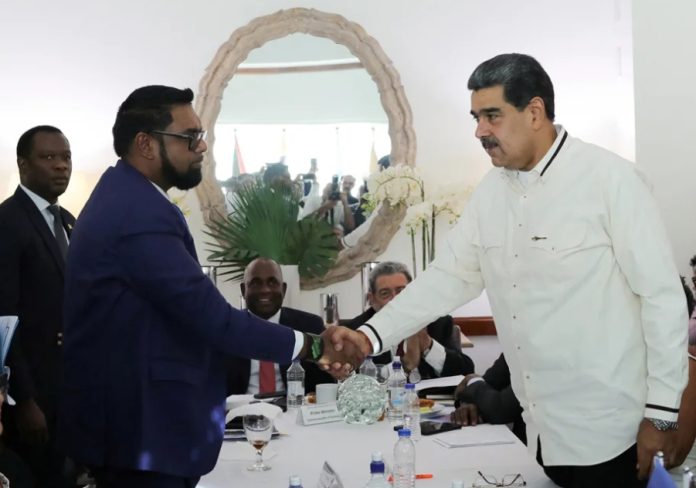The leaders of Venezuela and Guyana have agreed not to use force to resolve a territorial dispute over the oil-rich Essequibo region after a tense meeting in the Caribbean.
Venezuelan President Nicolás Maduro and Guyana’s President Irfaan Ali have agreed “not to threaten or use force against each other in any circumstances, including those arising from existing differences between the two states” and “to refrain, whether by words or deeds, from escalating any conflict,” according to an 11-point declaration that was read out at a press conference after the meeting.
However, the presidents failed to make progress in resolving the long-running dispute over the territory, and a joint commission comprising the foreign ministers of both countries and other officials was tasked to look into the matter and report back within three months.
Essequibo makes up more than two-thirds of Guyana’s territory, home to 125,000 of its 800,000 citizens.
The escalation of tensions in recent weeks comes after Venezuela held a referendum earlier this month on the creation of a Venezuelan state in the territory, which Guyana believes was a pretext for a land grab.
The Venezuelan authorities insist that Essequibo should be under its control because it was within its borders during the Spanish colonial period. Guyana, on the other hand, argues that the boundary drawn by international arbitrators in 1899 means that it is part of Guyana.
Ali and Maduro held an hours-long meeting at the main international airport on the eastern Caribbean island of St Vincent after mediation efforts by regional groups, the Community of Latin American and Caribbean States (CELAC) and the Caribbean Community (CARICOM).
Guyana’s representatives argue that the International Court of Justice in the Netherlands should resolve the dispute, while Venezuela says the court lacks jurisdiction.
Earlier in the day, the Guyana government issued a statement saying that Essequibo “is not a matter for discussion, negotiation or debate.” Ali repeated these words during a press conference he held between talks with Maduro. Ali said, pointing to a thick leather bracelet on his right wrist featuring the outline of Guyana:
All of this belongs to Guyana. No narrative propaganda [or] decree can change this. This is Guyana.
Ali emphasised that while both sides are committed to maintaining peace in the region, Guyana “is not the aggressor”. He added:
Guyana is not seeking war, but Guyana reserves the right to work with all of our partners to ensure the defence of our country.
On the eve of the meeting, Maduro said that “we will make the most of it so that our Latin America and the Caribbean remains a zone of peace.”
White House National Security Council spokesman John Kirby said the United States has its finger on the pulse of the situation in the region. He noted:
We don’t want to see this come to blows. There’s no reason for it to, and our diplomats are engaged in real-time.
Both sides have put their armed forces on alert. Maduro ordered state companies to explore and develop oil, gas and mines in Essequibo.
